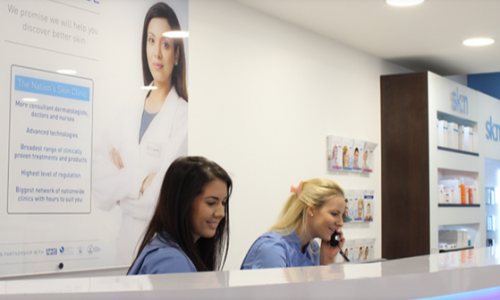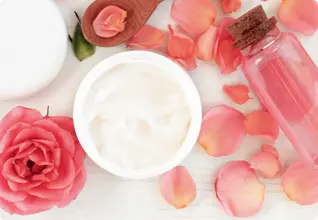How to stop excessive sweating in time for summer

Medically Reviewed June 2023, by Dr Benedetta Brazzini, for sk:n. Next review due June 2024.
With hotter days and lighter evenings to come, staying fresh is essential this summer. If you are anxious over the adverse effects of sweating and are struggling to keep cool, below is everything you need to know about excessive sweating and how to keep it at a minimum.
Why do we sweat?
Sweat and sweating are a sign your body is cooling down and can be prompted by hot weather, intense exercise, hormone fluctuations and emotions. Sweating is a normal bodily function that helps to regulate body temperature through the evaporation of perspiration.
Sweat is an electrolyte solution composed of 99% water, yet it can contain traces of sodium chloride, potassium, bicarbonate, calcium, magnesium, ammonia and urea.
The two most prominent sweat glands in the body are the eccrine and apocrine glands. The sweat produced from the eccrine glands consists mostly of water, and it is described as salty due to excess salt and proteins being released simultaneously. These glands cover most of the body, although sweat tends to denser on the soles of the feet, forehead and palms.
The apocrine glands are located on the armpits, groin and chest area, and are responsible for body odour and the releasing of pheromones. The apocrine glands secrete oily substances that are deposited through the hair canals, which is why they are found in areas that grow the most hair. As hair follicles can trap bacteria and odour, these areas are usually known to be the most prominently scented.
The sweat glands are fundamental in keeping our core body temperature at a constant level (between 36 – 37 degrees), as when the body becomes too hot, it can overwhelm our natural heat regulation process leading to hyperthermia (the opposite to hypothermia).
What is excessive sweating a sign of?
Excessive sweating is usually defined as such when it interferes with your daily activities and causes emotional distress. There are many reasons for heavy sweating, with menopause and pregnancy increasing your likelihood of experiencing its adverse effects, such as hot flushes and soaked clothes.
Underlying medical conditions such as having an overactive thyroid (hyperthyroidism), diabetes, low blood sugar (hypoglycaemia) and hyperhidrosis may also result in excessive sweating, night sweats and heat intolerance. Obesity and alcoholism can trigger episodes of heavy sweating also.
Sweat gland disorders are the common cause of any sweat related issues and can result in excessive sweating, decreased sweating and even no sweating at all. The condition responsible for excessive sweating is called hyperhidrosis and it is often harmless.
Hyperhidrosis is not a life-threatening condition, yet it can have a negative impact on the quality of life and lead to social withdrawal and feelings of self-consciousness. It can affect most parts of the body, but it commonly affects the armpits, hands and feet.
There are two types of hyperhidrosis, primary and secondary, and both are characterised by abnormal, excessive sweating and an overactivity within the sweat glands.
Primary hyperhidrosis has no underlying medical cause and excess sweating is not necessarily heat or exercise related.
Secondary hyperhidrosis, on the other hand, is the opposite. This means that any heavy sweating caused is due to a pre-existing medical condition.
If you are worried about abnormal sweating, or experience sudden changes in sweat levels, consult your doctor as this may mean an underlying medical condition is present and needs addressing.
How to stop excessive sweating
Unfortunately there is no cure for heavy sweating, however treating excessive sweating can be found through professional and natural means.
To reduce sweating naturally, it is recommended to wear breathable, lightweight fabrics such as cotton and linen and avoid wearing tight fitting, synthetic fabrics such as nylon.
As the feet can be a highly affected area with hyperhidrosis, wearing open-toed shoes and switching to mesh-based shoes for exercise can help reduce bacteria, odour and sweat build ups. Wearing absorbent socks, white and black clothes can also help hide the effects of heavy sweating and although this is not a permanent option, it can make you feel more comfortable.
Certain lifestyle changes can also help to minimise the effects of sweating. Switching from a deodorant to an antiperspirant may help prevent additional wetness as, unlike deodorants which only protects against odour, antiperspirants protect against both. Antiperspirants are effective as they contain active ingredients that work to temporarily obstruct the sweat glands. Look for aluminium chlorohydrate and aluminium zirconium on your antiperspirant ingredient list.
If you prefer a more natural approach, foods with highly acidic properties like lemon and apple cider vinegar, can be used as a solution to rub directly on the affected areas, which may help to remove bacteria and close up pores.
Spicy foods, alcohol and caffeine may also make your sweating worse, so avoiding these foods may help to lessen any adverse effects. These foods stimulate the adrenal glands, causing body temperature to rise and activating the heat regulation response where sweat is secreted to help cool the body. Sweat shields can also help disguise the effects of excessive sweating and act as a physical cover to hide sweat patches and blot wetness.
Excessive sweating treatment
Depending on the severity of your excessive sweating, your doctor may refer you to a specialist dermatologist. Alternatively, you could book a consultation with one of our expert dermatologists to take you through the causes and treatment options available to you.
Professional treatments for hyperhidrosis are:
- Oral medications – to help prevent the stimulation of sweat glands
- Prescription antiperspirants with clinical strength
- Iontophoresis – a mild electrical current is passed through a water solution to allow ions to cross the skin’s barrier and block sweat ducts
- Anti-sweat injections – an extremely effective and clinically proven treatment option to reduce sweating
Key takeaways
- Sweating is normal and is only a problem when it affects your daily life and causes emotional distress
- Hyperhidrosis is the medical name for heavy sweating and it is usually harmless
- If you have sudden changes in your sweating, you may be experiencing symptoms of an underlying condition and should speak to your doctor
- Sweating can be reduced through vigilant lifestyle habits, prescribed medications and antiperspirants
Related Articles

08
Apr 2024

08
Apr 2024
Request a callback
One of our friendly sk:n advisors will call you to book your consultation.
- More than 450 consultants, doctors, nurses and medical practitioners
- Regulated by the Care Quality Commission, Health Inspectorate Wales and Health Improvement Scotland
- Partner of the NHS
- Rated excellent by our clients on Trustpilot
- Strict safety and care protocols





